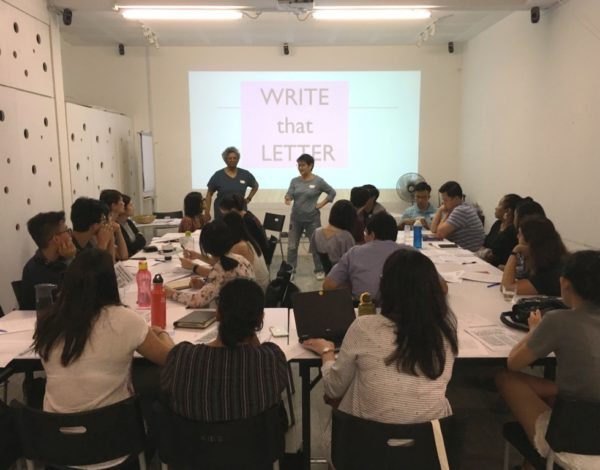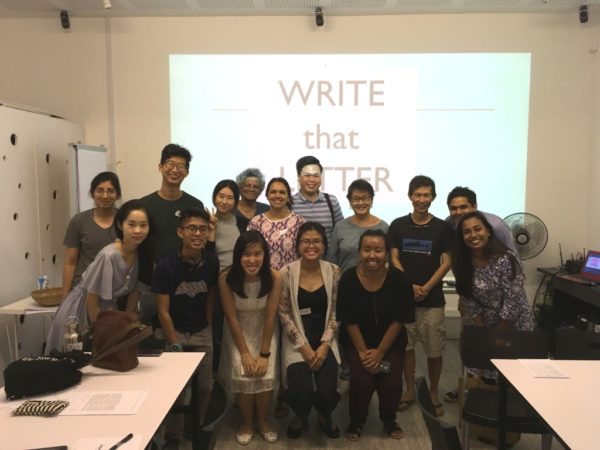-
Advocacy Theme
-
Tags
- Abortion
- Adoption
- Caregiving
- CEDAW
- Disability
- Domestic Violence
- Domestic Workers
- Harassment
- Healthcare
- Housing
- International/Regional Work
- Maintenance
- Media
- Migrant Spouses
- Migrant Workers
- Muslim Law
- National budget
- Parental Leave
- Parenthood
- Polygamy
- Population
- Race and religion
- Sexual Violence
- Sexuality Education
- Single Parents
- Social Support
- Sterilisation
- Women's Charter
A Recap: Write Forum – Writing Workshop by Constance Singam and Dana Lam
November 29th, 2019 | Letters and op-eds, News, Views

Written by Aria Lee
“Who do you think you are?”
This was the question that Dana Lam, former president of AWARE, was asked by an aunt when she wrote her first forum letter to a newspaper.
“Little did she know,” said Dana now, years later. She grinned cheekily as around the room, workshop participants chuckled. Write Forum was a letter-writing workshop that took place at the AWARE Centre on Saturday, 16 November, 2019. Dana, along with Constance Singam (another former AWARE president), led the session. The two women shared their extensive experience writing letters advocating for policy and social change in Singapore over the years.
Write Forum’s 20-something participants came from various organisations, advocating for many different causes. Accordingly, they were themselves familiar with how slowly change can take place in society, and the need for activists to speak up to push the needle on social issues. Participants noted that many ideas we take for granted today—such as the right for Singaporean women living overseas to have their children granted citizenship, or equal gender representation in medical schools—were advocated for over many years before they were widely accepted. Indeed, some were met with ridicule.
So where does writing letters (concerned citizen letters, group representative letters, campaign letters, and even longer op-eds) come in? Well, because newspapers continue to reach a broad audience in Singapore, they provide one of the best platforms for a regular citizen to get his or her views to the relevant authorities—who may not always get the perspective of citizens on the ground of an issue.
From there, pressure may slowly mount around an issue. Sometimes it takes a few generations of letter-writers telling the story over and over and continually bringing up a problem until the issue can no longer be ignored.
Constance (better known as Connie) began by recounting how she wrote to a newspaper after her husband suffered a heart attack during the night while in hospital. He did not receive prompt medical attention, and sadly passed away. Connie believes that her letter, in combination with another similar critical accident occurring around the same time, led to the government requiring hospitals to have doctors in attendance 24/7.
After Connie joined AWARE in the ’80s, her letter-writing took off even more. Connie and Dana cited the many different letters they had written to engage the government and public, on issues including expanding awareness on violence, getting hospitals to keep better records, and improving training for police and service providers on cases of abuse and sexual assault.
For example: In a letter written in response to housing and aid policies favoring married women, Connie wrote, “A woman in Cabinet would have told the Prime Minister that no woman would take on the burden of single motherhood willingly… Most single mothers are abandoned mothers. First, the father abandons them, then the state, too, abandons them.”
After walking through the above examples, Dana and Connie imparted their best letter-writing tips. These included:
- Having a hook to capture attention
- Prioritising your main points/goals
- Writing with concision and clarity
- Adding in your suggested solutions to a problem
- Avoiding naming (or blaming) particular individuals
- Responding to relevant recent events in a timely manner
The two women also stressed that writers should keep in mind the big picture and ensure that their core messages are kept at the forefront of a piece.
“Remember,” Dana said, “your objective is to get a policy examined and start a productive discussion, not to just rant.”

After the main presentation, participants got into small groups and analysed six different advocacy letters, making comments and asking questions to the presenters. Then, they were given time to practice writing their own letters and garner some feedback.
Connie and Dana noted that regardless of the level of response one letter may receive, someone is listening. Activists, therefore, must not become discouraged when impact is not immediate. Despite its difficulties, advocacy has come a long way in Singapore, they reflected, and time has proven that there are always people willing to learn and speak up. Ultimately, everyone has a voice and collectively, these voices matter.
“In the end, if you can’t do anything about an issue at the moment, at least you can inform your fellow citizens about it,” Dana concluded.



